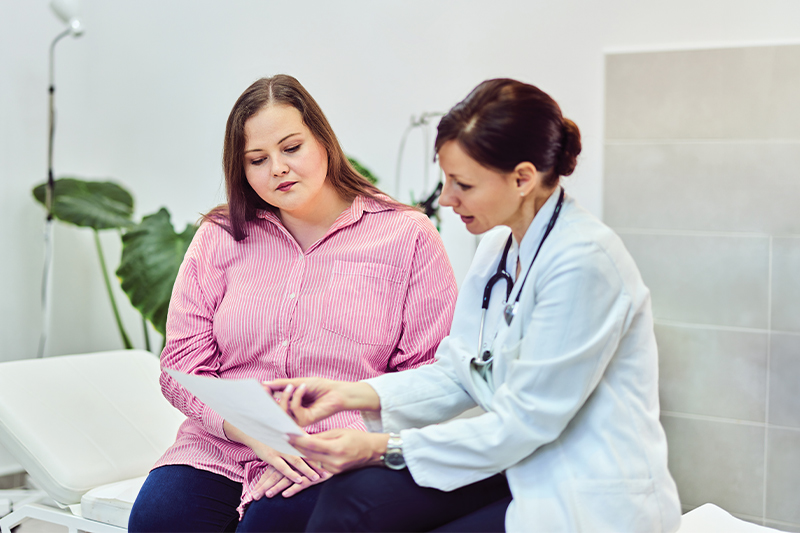
5 minute read
Living with PCOS
Living with PCOS
By Tory Irmeger
Polycystic ovary syndrome (PCOS) is a common endocrine disorder, affecting up to 15% of women. Those with PCOS often experience irregular menstrual cycles, excess hair growth, and unpredictable ovulation that causes infertility. Although PCOS can be present from the onset of puberty, many individuals don’t receive a diagnosis until attempting to get pregnant. It’s important to recognize the symptoms of this syndrome so that individuals living with PCOS can take steps to mitigate negative symptoms and improve overall quality of life.

What causes PCOS?
While the exact cause of PCOS is unknown, many of its symptoms are caused by unusually high levels of hormones in the body called androgens. While androgens are present in both men and women, an excess of these hormones in women can result in unpredictable ovulation, excess hair growth, and other symptoms. Lack of ovulation causes small follicle cysts to develop on the ovaries, although not all ovarian cysts are associated with PCOS. There is evidence that genetics play a role, as those with a mother or sibling with PCOS have an increased likelihood of developing the condition as well.
“Research on PCOS is ongoing, but the outlook appears promising. There is a focus to improve diagnostic methods, better understand the underlying causes, develop more effective treatments, and enhance the overall quality of life for individuals affected by this condition,” says Dr. Lauren Thomas, a specialist at Galen Obstetrics and Gynecology.
Symptoms
While it’s possible to have PCOS and not experience symptoms, there are often signifiers that may vary from person to person. Common signs include:
Irregular periods. Individuals with PCOS commonly experience irregular menstrual cycles, skipped periods, spotting, or heavy bleeding during periods.
Abnormal hair growth and acne. Due to higher levels of androgens in the body, those with PCOS may grow excess hair on the face, arms, chest, or abdomen. Alternatively, PCOS can also cause alopecia, as well as acne or patches of dark skin.
Infertility. PCOS causes irregular ovulation, which often makes it difficult for individuals to become pregnant. This condition can increase risks involved with pregnancy, although many individuals with PCOS are able to successfully carry a pregnancy.
Overweight or obesity. As an endocrine disorder, PCOS is correlated with insulin resistance, and it’s estimated that between 40-80% of individuals with PCOS also have obesity and may struggle to maintain a healthful weight. An increase in insulin levels causes the ovaries to produce and release androgens, which, in excess, exacerbates PCOS symptoms.
Depression, anxiety, or other mental health disorders. Studies have shown an increased prevalence of depression and anxiety in individuals with PCOS. Lack of treatment and body image issues may contribute to these conditions.

Diagnosis
Diagnosing PCOS involves ruling out any other possible health problems by reviewing your symptoms, medical history, and family history with a healthcare provider. Providers typically look for at least two of three symptoms for a diagnosis: irregular or missed periods, signs of excess androgens, and/or evidence of ovarian cysts. Note, it’s possible to develop and be diagnosed with PCOS without the evidence of cysts. Aspects of physical examinations might include a pelvic exam, so your provider can check for growths or masses on the reproductive organs, blood tests to measure hormone levels, and/or a pelvic ultrasound to examine the ovaries and uterine lining.
“For those affected by PCOS, symptoms such as excess fatigue, skipping cycles, weight gain, sleep problems, or headaches often first appear
around puberty. Because many of these symptoms are signs of other diseases, it can be hard to diagnose PCOS. Once other conditions are ruled out, ask your doctor about a PCOS diagnosis if you’re experiencing irregular periods, unwanted hair growth, acne, and hair loss on scalp, or small cysts on the ovaries,” says Dr. Jeanie Dassow of Erlanger Women’s Health.
Because the symptoms of PCOS overlap with other gynecological conditions, it may be difficult to determine what is normal and what isn’t for your body. Tracking your periods, weight fluctuations, acne flare-ups, and differences in hair growth can help you and your physician determine the cause of reproductive health-related issues. No matter how mild or severe your symptoms, early diagnosis and intervention is a crucial step in improving overall well-being and preventing additional health risks.

Treatment
While there is no known cure for PCOS, there are treatment plans available to manage uncomfortable symptoms. “Managing PCOS involves a combination of lifestyle changes, medication, and sometimes surgical interventions,” says Dr. Thomas. “A healthy diet balanced with fruits, vegetables, whole grains, and lean proteins can help manage weight and regulate insulin levels.
Regular exercise, including both aerobic and strength training, improves insulin sensitivity while reducing stress levels and promoting overall well-being.”
To assist with conception, certain medications may be prescribed to induce ovulation, including clomiphene, letrozole, and gonadotropins. In vitro fertilization (IVF) may also be an avenue to help those with PCOS become pregnant. For individuals not looking to become pregnant, medications like hormonal birth control may be prescribed to regulate the menstrual cycle and manage acne and excess hair growth. If a medication is causing negative side effects that affect your quality of life, consult with your physician about pursuing an alternative treatment option.
PCOS symptoms can continue after menopause, so it’s important to pursue treatment options even past the reproductive stage of life. Dr. Thomas adds, “It is important for individuals with PCOS to have regular checkups with healthcare providers to monitor their condition. Understanding PCOS symptoms and management options empowers individuals to make informed decisions about their health.”
_____
Jeanie Dassow, MD OB/GYN | Erlanger Women’s Health
Lauren Thomas, MD OB/GYN | Galen Obstetrics & Gynecology, Ridgeside





